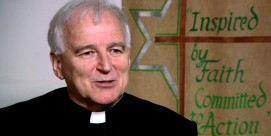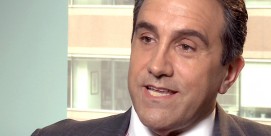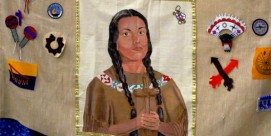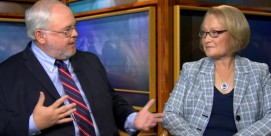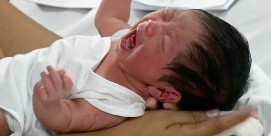In This Episode << SLIDE LEFT TO SEE ADDITIONAL SEGMENTS
John Podesta Extended Interview
Read more of R & E’s interview about Catholic voters with John Podesta:
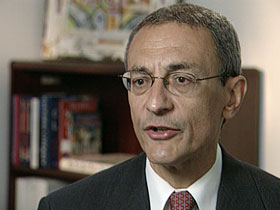
[Catholics are] a key swing vote in this election, and if you look at that both nationally or by the key swing states where there are a lot of Catholic voters, both campaigns are trying to reach out to Catholic voters. The Catholic vote seems to still be splitting toward John Kerry, and I think that is likely to be where it ends up.
Obviously in 1960, when John F. Kennedy first ran for president — not as the first Catholic to run, but the first Catholic to get elected — the Catholic community really swung behind his candidacy. But he was being attacked for being a Catholic, which highlighted the need for Catholics to defend their candidate. He was, by far, the high-water mark. Since that time, I think things have leveled off. President Reagan got close to a majority if not a majority — I can’t recall precisely — of the Catholic vote. The Democrats tend to get a little bit more of the Catholic vote, and as the demographics of the Catholic community change, as there are more Latino voters in the United States, I think the Catholic vote will increasingly become, if you look at it overall, Democratic again.
If you look at the underlying attitudes of Catholic voters, they look pretty much just like the rest of America. There are a core of voters for whom [abortion] is the only issue, and a few bishops for whom [abortion] is the only issue, but I think the vast majority of Catholics follow what the Catholic bishops have put out in their guide to the Catholic community on faithful citizenship, on how one approaches voting as a Catholic, which is to approach all of the issues and to view [abortion] as an issue among a whole panoply of moral issues — moral questions about how we are going to treat the needy in the society, how we are going to deal with issues of social justice and deal with issues of war and peace. I think there is a broad range of issues that Catholics look to. If you look specifically at the abortion issue itself, Catholics pretty much mirror the U.S. population in general. It is a moral question for people, but when you get down to the question of do you want to make abortion illegal and make it criminal again in the United States, a majority of Catholics don’t agree with that position.
I’ve been a practicing Catholic my whole life, and I’ve never considered it a Catholic value to be for the rich at expense of the poor, to be for the special interests at the expense of common good. I think [President Bush] is trying to use code words for a very narrow social agenda that he’s playing with conservative Catholics, and I suppose that it plays very well with a core of Catholic voters who are a part of the conservative base in this country. But I don’t think it reflects the views of the vast majority of the Catholic people, the Catholic laity at least, in this country. He’s done something which was really quite shocking, which was to go to the Vatican and to ask the Vatican to actually intervene in the U.S. election and try to instruct their bishops to instruct the laity on how they should vote in this election. Imagine that in 1960, when we were talking about whether John Kennedy would be controlled by the Vatican. We’ve now almost totally reversed that. You have George Bush actually asking the Vatican to try to exercise control and discipline over Catholic voters, but Catholics are probably like most Americans. They’re a pretty rowdy lot; they are pretty hard to control, particularly just by edicts coming from on high from cardinals they don’t know in the Vatican. I don’t think that is going to make much difference to Catholic voters in this country.
John Kerry is a practicing Catholic. I think that he approaches public life through a value base that is rooted in Catholic social teaching, and I think that is what he has fought for in public office. I think that is, in part, what brings him to public service and public life. He obviously wrestled with that, as I think many of us do. As a young man, he found importance in his faith, and it helped form meaning for his public life as well as, obviously, his private life. As he said in his convention speech, he doesn’t wear his religion on his sleeve. It’s probably not the tradition particularly among Northern Catholics to do that. But I think that it really does inform what he’s done — the work that he’s pursued in the Senate, his work for the less privileged, his work for the elderly. That is very much part and parcel of who he is as a man and what brings him to public life.
The census just released new data a few weeks ago that showed that 5 million more people were uninsured. It showed that poverty was going up again in the country. It showed that we have a minimum wage at which if you are supporting a family of three working 40 hours a week, 52 weeks a year, you live 28 percent under the poverty level. We see people who are now struggling, falling back onto welfare, and I think that an economic policy that aims to try to protect people and to try to bring people into the middle class and help people to stay in the middle class is one that is very much rooted in Catholic social teaching. And not trying to define issues solely as ones that affect only Americans but as ones that affect people in the world — [John Kerry’s approach] to foreign policy is an attempt to try and build a stronger coalition, a stronger alliance around the world in the war against terrorism. It seems to me to be more consistent with where Catholic social teaching has been.
The Catholic Church accepts the doctrine of “just war,” but I think the Vatican found that [the Bush administration’s] doctrine of preemption doesn’t meet the [just war] standards, particularly in Iraq. I think that the Vatican was a strong critic particularly of the president’s unilateral action in pursuing this doctrine of preemption. I would argue that it wasn’t a successful execution of a national security strategy. I think that it actually makes the country less safe rather than safer. I think that is clearly the Vatican’s perspective and the perspective of the Catholic laity in this country. It is also a moral challenge to find the right way both to confront a person who is actually brutalizing his own population and do it in a way that is going to actually expand peace in the world and try to deal with a circumstance where you can provide a more secure environment for both the people of Iraq, the people of the United States, and the people of the world as well.
My personal view is that Senator Kerry may have learned the wrong lesson from the 1960 campaign, at least at the beginning of this campaign. I think he has done better more recently. But I think that John Kennedy set a standard when he gave that famous speech in Houston in which he said, “My faith is a matter that shouldn’t concern anybody but me, and I’m going to exercise my judgment on behalf of all the American people and obviously not be controlled by the Catholic hierarchy.” I think the challenge that then Senator Kennedy was under was one in which he was being challenged on how he would govern. Senator Kerry is being challenged on whether he really, truly has faith. Those are very different things. I actually think it’s quite unfortunate that attacking someone’s faith, not accepting someone’s faith, has become one more wedge issue and political issue and fodder for negative campaigns by outside groups and agents for the other side. But be that as it may, the American public wants to know what’s in your core, what makes you tick, what’s your moral dimension that you’re going to bring to bear on important public issues. They want to know when you close the door in the Oval Office, what values do you bring to the table? It’s important for candidates to be able to project that, and where you have a person like Senator Kerry who has such a strong moral dimension to his life, to his work, it’s a mistake for both the candidate and the campaign not to expose people to that. You’ve got to be authentic in doing it. I would never recommend to a candidate to quote the Bible more if that’s uncomfortable. There are different ways of speaking with moral clarity about the issues you care about, talking about what’s right and what’s wrong and why you think that, that really do begin to give people a sense of the moral essence of who you are as a human being and the religious values that shape that. I think that helps them make up their minds about who you are. There was a poll several months ago that one of the news magazines did, that said only 7 percent of the American public thought Senator Kerry had strong religious views. That is, to some extent, a failing of the campaign, because it is part and parcel of who you are, you need to let people know that. I think Senator Kerry did a lot better in his convention speech, where he really laid this out in his own way and in an honest way when he said, “I don’t wear this on my sleeve, but here’s who I am.” I think it was very compelling. But he needs to keep that going. Even in the last few weeks of the campaign, people need to sense that.
I’ll leave it to after Election Day to decide whether [Republican outreach to Catholics] has been effective. I think the Bush campaign particularly has gone over the edge in involving the campaign in direct church affairs. They collect rosters; they put out mailings that were approved by the Republican National Committee that say liberals want to ban the Bible. I think they have used religion as a wedge issue, actually, which is really unfortunate. I think it began with people like Jerry Falwell, and it’s culminated in the way the Republican National Committee is trying to make churches around the country be adjuncts to the campaign. The American public doesn’t like that. They reject it; they think there is a place for religious leaders to give moral guidance to people in their churches and synagogues and mosques, but I don’t think they want to see churches just become part of a massive political machine, and that’s what the Republicans are trying to do this year. Whether they pay a price for it or not, I guess we’ll know in November.
Maybe Catholics end up being a little bit self-selective about where they go to church these days. It used to be, when I was growing up, you were born in a parish. You were probably baptized in a parish, maybe got married in a parish, and were buried in the same parish. Now people are more mobile and they self-select into parishes that they’re more comfortable with. You can live a life, as I do, as a practicing Catholic and not see as much of [ ] as reporters who are going out looking for it will find. In the Catholic Church, both the clergy and the laity have tried to provide moral guidance, but again I come back to the bishops’ statement on faithful citizenship — a very broad and sophisticated and smart document about all the issues that are facing us as citizens, as voters, and as people of moral faith. But they also call you to look at the whole and to exercise your vote when you go into the voting booth based on what you think is the best judgment. This getting in and using the Church as part of a political machine is kind of new, I think. At least I haven’t seen it that much in a Catholic church before.
When I go to church, and I listen to the gospel of Jesus and think about what he’s trying to, what he said, and what he says to us every day, I feel pretty confident that if people listen to that gospel they are going to vote in a way that is reflective of a strong direction of this country to make it more just, more fair, and more peaceful at the end of the day.

